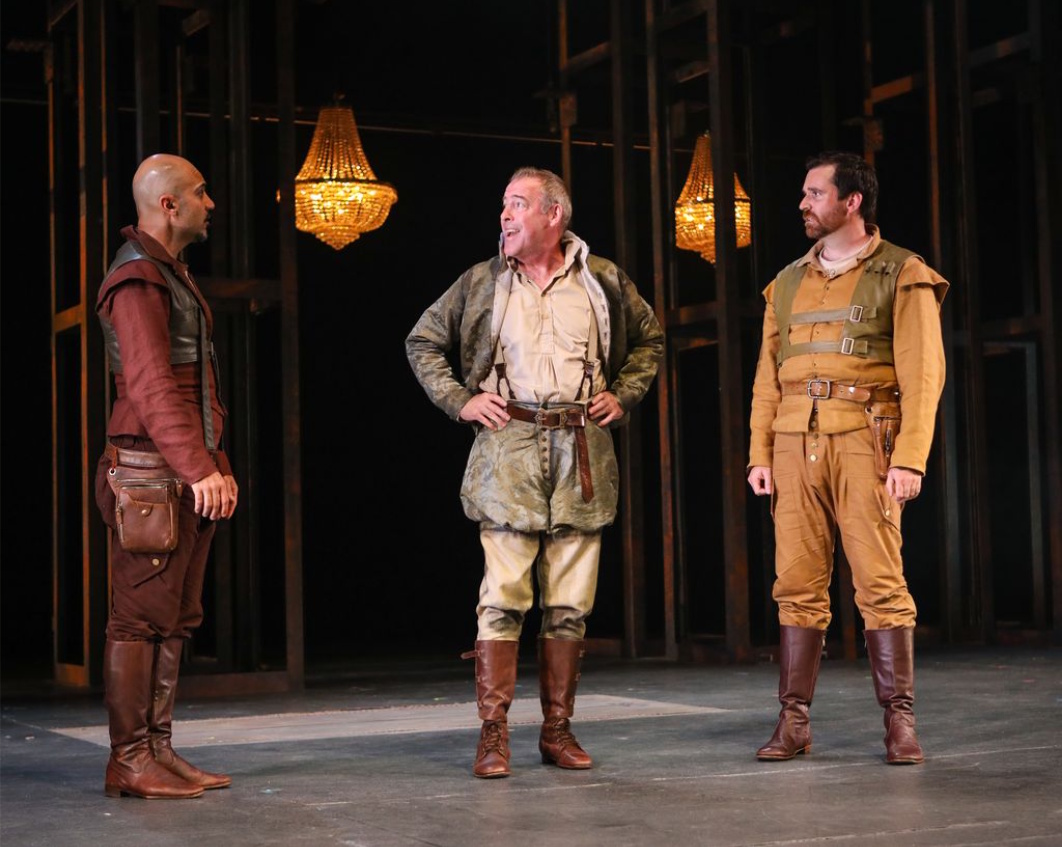Cerebral and funny, Tom Stoppard’s existential comedy “Rosencrantz and Guildenstern Are Dead” takes two minor characters from Shakespeare’s “Hamlet” and puts them on a stage, mostly alone, to ponder whether they control their own existence or are simply pawns in something bigger and beyond their control. Pennsylvania Shakespeare Festival’s production is both entertaining and profound.

“Rosencrantz and Guildenstern Are Dead” runs through Aug. 2 on the Main Stage Theatre, Labuda Center for the Performing Arts, DeSales University, in Center Valley.
“Rosencrantz and Guildenstern Are Dead” is being performed in repertory with “Hamlet” which is running through Aug. 3. Repertory means the same actors perform in both plays, sometimes on the same day, and the two plays use the same stage. I had the pleasure of seeing “Hamlet” when it opened and while, knowledge of “Hamlet” is not required to see this show, seeing the same actors approaching Shakespeare’s tragedy in a very different way definitely enhanced the experience.
Rosencrantz and Guildenstern are childhood friends of Hamlet who are brought to court by king Claudius (a boisterous Akeem Davis) to spy on Hamlet (a brooding Biko Eisen-Martin.)
But nothing goes as planned and the hapless pair are lost in an existential plane outside of reality, where flipping coins that eternally come up heads demonstrates the laws of probability are broken.
Maboud Ebrahimzadeh’s Guildenstern is serious and analytical, which leads to bouts of depression, while Sean Close’s Rosencrantz is childlike and cautiously optimistic, gleefully playing the games the two men create to pass the time.
Together, the actors amusingly bounce off each other trying to figure out their part in the story, worrying and bickering, while always having each other’s back.
Both men skillfully hold the mostly empty stage, impressively trading Stoppard’s rapid-fire wordplay.
Occasionally, the “real” play interferes and they are forced to reluctantly play their prescribed roles as Hamlet rages and Claudius schemes.
A band of players are the only other people who wander around the same emptiness, looking for an audience. Their leader, played by a charismatic Ian Merrill Peakes, is equal parts cunning rogue and eloquent philosopher.
As the play progresses, there are increasing hints that things might not end well for Rosencrantz and Guildenstern and they woefully ponder the meaning of it all.
On the same stage as “Hamlet,” the show uses “Hamlet’s” industrial set, but more minimally. Some rolling set pieces delineate the mostly bare stage and a row of chandeliers drops in when the “real” play interjects itself.
The same harsh lighting that accentuated the drama of Hamlet's soliloquies, creates foreboding shadows of Guildenstern and Rosencrantz. Lighting and stage design is by Brian Sidney Bembridge.
Director and PSF artistic director Jason King Jones guides the cast of 17 as they navigate the existential ins and outs of this dark but ultimately fascinating journey.
The play is recommended for ages 13 and older because of mild adult language, some dark humor, and occasional references to violence and death.
Meet the actors after the show for a talk-back July 24.
The Aug. 2 performance will feature open captioning for patrons who are deaf or hard of hearing and audio descriptions for patrons who are blind or visually impaired.
Performances are 7:30 p.m., July 23, 24, 26 and Aug. 1; 2 p.m. July 27, 30 and Aug. 2; and 6:30 p.m. July 29.
For information, call 610-282-9455, or go to pashakespeare.org/.
